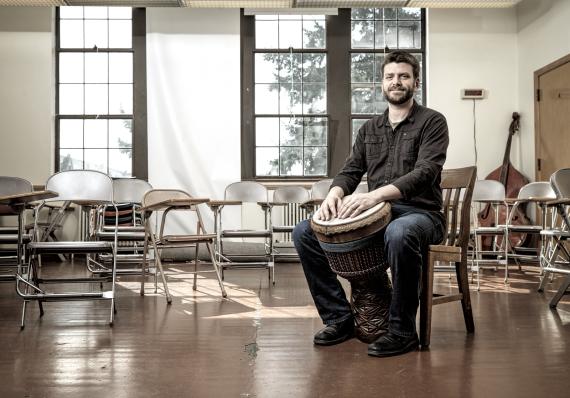The Ebola outbreak in Guinea, West Africa has resulted in profound financial stresses on many Guinean people due to restrictions on travel, resource scarcity, and escalating prices on basic necessities. In Seattle, a group of Guinean artists and supporters—including UW doctoral student James Morford—are using the performing arts to raise awareness and address critical needs in an area of the world in crisis.
Morford, a PhD candidate in the UW’s Ethnomusicology program, is a founding member of the Guinea Arts Cooperative (GAC), a local group of Guinean artists and supporters who are leveraging their combined efforts to make a difference in the lives of Guineans affected by Ebola.
“Our purpose in forming the GAC was to initiate community-driven arts-based events with the goal of raising funds for people in Guinea so that they can meet basic needs,” Morford says.
To that end, the GAC presents “Beyond Ebola,” a series of benefit events March 13-15 at UW and off-campus locations and continuing through the month of March. Proceeds will be used to distribute essential resources to the families and extended networks in Guinea supported by artists living in the Seattle area, Morford says, and to provide additional assistance to the broader community in Guinea through a partnership with the UN World Food Programme.
“Ebola has killed a relatively limited number of people in Guinea when compared to other diseases such as malaria, but the economic impact has been profound,” Morford says, recounting some of the reverberating impacts: In the wake of a growing epidemic, drum and dance camps that had been a healthy arm of the tourism industry and a vital source of income for artists and teachers shut down, and restrictions on group gathering eliminated opportunities for professional musicians who had previously relied on income from performing at celebrations, weddings and other gatherings. Price-gouging on basic essentials has caused further grave impacts, as have other factors that have upset established means of sustenance and networks of support between Guinean artists living in Seattle and their extended family networks in Guinea.
“The goal is to provide aid in careful ways,” Morford says. “We are not looking to create a culture of dependence.” He says the group will disburse proceeds through direct giving, assessing basic needs, and then providing those essentials, whether needs are for bleach, or gloves, or food, or clean water. “We are trying to be flexible but also trying to be careful, working to meet the needs of those people as expressed by those people.” A smaller portion of the benefit proceeds, he says, will go to the UN World Food Programme to distribute aid more broadly.
The series gets under way March 13 and 14 with workshops and performances at the UW's Ethnic Cultural Center and continues with additional performances and activities at University Heights and Jazz Alley, as well as a silent online auction (Click on links below for additional details of performances and events). The campus events are co-sponsored by the UW Ethnomusicology Students Association.
Morford’s involvement with GAC is the latest development in his ongoing participation in the study and performance of music of West Africa. As an undergraduate at West Virginia University, he played in an African drum and dance ensemble under renowned African musician Paschal Younge, an experience that evolved into performance opportunities internationally with a group led by Younge. After college, Morford taught general music at the K-6 levels in Puyallup and continued performing music, eventually moving to Seattle and connecting with Guinean drum and dance teachers living here.
“I began to see it as a potential rich area for research,” he says, “and eventually it blossomed into my research community.” His specific area of interest is the globalization of music and dance from Guinea and mobilities between Guinea and Seattle, in the sense of analyzing how the Seattle Guinean music scene is “in line with and also separate from” patterns in this music scene internationally.
The Ebola epidemic has created further permutations in those established patterns, as he has discovered first-hand. A planned trip to Guinea last December to embed himself in drum and dance camps for the purpose of further close study had to be put on hold when the camps shut down and travel restrictions were put into place. Guinean artists in Seattle have faced challenges in maintaining contact and lines of communication with artists and family members in Guinea. Such challenges intensified Morford’s impulse to “do something to help,” he says, and drove his involvement in helping to form the GAC.
“Jim is deeply involved, as a performing musician and scholar, in the Guinean ex-pat community of musicians," says Ethnomusicology chair Patricia Campbell. “His long interest is music of Africa, especially West, especially Ghana and Guinea. He has been involved daily for two years as a player in the Guinean drum-dance community, in venues all over Seattle, the Puget Sound, the Pacific Northwest. He is an important and committed member of this Guinean community that is rooted in Seattle but with satellites in Olympia, Boise, Portland, and elsewhere," she says, adding, “Jim’s work really illustrates the power of music to bring people together for a critically important cause.”
More information on the Guinea Arts Cooperative is available here. Visit our events calendar for the full lineup of UW-area events.
Beyond Ebola Events
-
Beyond Ebola performance at the Ethnic Cultural Theatre (UW) Friday March 13.
-
Dance and Music Workshops at Ethnic Cultural Center and University Heights Saturday and Sunday, March 14 and 15.
-
Performance by Message from Guinea at Jazz Alley Monday, March 30.
- Silent Online Auction.
